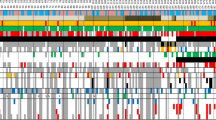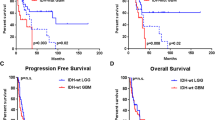Abstract
Glioblastoma is the most common and the most aggressive type of brain cancer. Aberrations of the RTK/RAS/PI3K-, p53-, and RB cell signaling pathways were recognized as a core requirement for pathogenesis of glioblastoma. The p53 tumor suppressor functions as a transcription factor transactivating expression of its target genes in response to various stress stimuli. We determined the p53 status in 36 samples of glioblastoma by functional analyses FASAY and split assay. Seventeen p53 mutations were detected and further analyzed by cDNA and gDNA sequencing in 17 patients (47.2 %). Fifteen (88.2 %) of the mutations were missense mutations causing amino acid substitutions, seven of them exhibited temperature-sensitivity. Two mutations were determined as short deletions, one of them causing formation of premature termination codon in position 247. Fluorescent in situ hybridization revealed the loss of the p53-specific 17p13.3 locus in four of 33 analyzed samples (12 %). In 12 out of 30 samples (40 %), the p53 protein accumulation was shown by immunoblotting. There was high (80 %) concordance between the presence of the clonal p53 mutation and the p53 protein accumulation.


Similar content being viewed by others
References
Kleihues P, Louis DN, Scheithauer BW, Rorke LB, Reifenberger G, Burger PC, Cavenee WK (2002) The WHO classification of tumors of the nervous system. J Neuropathol Exp Neurol 61:215–225
Parsons DW, Jones S, Zhang X et al (2008) An integrated genomic analysis of human glioblastoma multiforme. Science 321:1807–1812
Cancer Genome Atlas Research Network (2008) Comprehensive genomic characterization defines human glioblastoma genes and core pathways. Nature 455:1061–1068
Harris SL, Levine AJ (2005) The p53 pathway: positive and negative feedback loops. Oncogene 24:2899–2908
Sherr CJ (2004) Principles of tumor suppression. Cell 116:235–246
Haupt Y, Maya R, Kazaz A, Oren M (1997) Mdm2 promotes the rapid degradation of p53. Nature 387:296–299
Honda R, Tanaka H, Yasuda H (1997) Oncoprotein MDM2 is a ubiquitin ligase E3 for tumor suppressor p53. FEBS Lett 420:25–27
Wu XW, Bayle JH, Olson D, Levine AJ (1993) The p53 mdm-2 autoregulatory feedback loop. Genes Dev 7:1126–1132
Watanabe K, Sato K, Biernat W, Tachibana O, von Ammon K, Ogata N, Yonekawa Y, Kleihues P, Ohgaki H (1997) Incidence and timing of p53 mutations during astrocytoma pregression in patients with multiple biopsies. Clin Cancer Res 3:523–530
Kraus JA, Glesmann N, Beck M, Krex D, Klockgether T, Schackert G, Schlegel U (2000) Molecular analysis of the PTEN, TP53 and CDKN2A tumor suppressor genes in long-term survivors of glioblastoma multiforme. J Neuorooncol 48:89–94
Schiebe M, Ohneseit P, Hoffmann W, Meyermann R, Rodemann HP, Bamberg M (2000) Analysis of mdm2 and p53 gene alterations in glioblastoma and its correlation with clinical factors. J Neurooncol 49:197–203
Schmidt MC, Antweiler S, Urban N, Mueller W, Kuklik A, Meyer-Puttlitz B, Wiestler OD, Louis DN, Fimmers R, von Deimling A (2002) Impact of genotype and morphology on the prognosis of glioblastoma. J Neuropathol Exp Neurol 61:321–328
Peraud A, Kreth FW, Wiestler OD, Kleihues P, Reulen HJ (2002) Prognostic impact of TP53 mutations and p53 protein overexpression in supratentorial WHO grade II astrocytomas and oligoastrocytomas. Clin Cancer Res 8:1117–1124
Batchelor TT, Betensky RA, Esposito JM, Pham LDD, Dorfman MV, Piscatelli N, Jhung S, Rhee D, Louis DN (2004) Age-dependent prognostic effects of genetic alterations in glioblastoma. Clin Cancer Res 10:228–233
Ohgaki H, Dessen P, Jourde B, Horstmann S, Nishikawa T, Di Patre PL, Burkhard C, Schuler D, Probst-Hensch M, Maiorka PC, Baeza N, Pisani P, Yonekawa Y, Yasargil MG, Lutolf UM, Kleihues P (2004) Genetic pathways to glioblastoma: a population-based study. Cancer Res 64:6892–6899
Rich JN, Hans C, Jones B, Iversen ES, McLendon RE, Rasheed BKA, Dobra A, Dressman HK, Bigner DD, Nevins JR, West M (2005) Gene expression profiling and genetic markers in glioblastoma survival. Cancer Res 65:4051–4058
Momota H, Narita Y, Matsushita Y, Miyakita Y, Shibui S (2010) p53 abnormality and tumor invasion in patients with malignant astrocytoma. Brain Tumor Pathol 27:95–101
Birner P, Piribauer M, Fischer I, Gatterbauer B, Marosi C, Ungersbock K, Rossler K, Budka H, Hainfellner JA (2002) Prognostic relevance of p53 protein expression in glioblastoma. Oncol Rep 9:703–707
Srividya MR, Thota B, Arivazhagan A, Thennarasu K, Balasubramaniam A, Chandramouli BA, Hegde AS, Santosh V (2010) Age-dependent prognostic effects of EGFR/p53 alterations in glioblastoma: study on a prospective cohort of 140 uniformly treated adult patients. J Clin Pathol 63:687–691
Flaman JM, Frebourg T, Moreau V, Charbonnier F, Martin C, Chappuis P, Sappino AP, Limacher JM, Bron L, Benhattar J, Tada M, Van Meir EG, Estreicher A, Iggo RD (1995) A simple p53 functional assay for screening cell lines, blood, and tumors. Proc Natl Acad Sci USA 92:3963–3967
Smardova J, Nemajerova A, Trbusek M, Vagunda V, Kovarik J (2001) Rare somatic p53 mutation identified in breast cancer: a case report. Tumor Biol 22:59–66
Ishioka C, Frebourg T, Yan YX, Vidal M, Friend SH, Schmidt S, Iggo R (1993) Screening patients for heterozygous p53 mutations using a functional assay in yeast. Nat Genet 5:124–129
Waridel F, Estreicher A, Bron L, Flaman JM, Fontolliet C, Monnier P, Frebourg T, Iggo R (1997) Field cancerisation and polyclonal p53 mutation in the upper aerodigestive tract. Oncogene 14:163–169
Petitjean A, Mathe E, Kato S, Ishioka C, Tavtigian SV, Hainaut P, Olivier M (2007) Impact of mutant p53 functional properties on TP53 mutation patterns and tumor phenotype: lessons from recent developments in the IARC TP53 database. Hum Mut 28:6292–6299
Grochova D, Vankova J, Damborsky J, Ravcukova B, Smarda J, Vojtesek B, Smardova J (2008) Analysis of transactivation capability and conformation of p53 temperature-dependent mutants and their reactivation by amifostine in yeast. Oncogene 27:1243–1252
Van Meir EG, Kikuchi T, Tada M, Li H, Diserens AC, Wojcik BE, Huang HJS, Friedmann T, de Tribolet N, Cavenee WK (1994) Analysis of the p53 gene and its expression in human glioblastoma cells. Cancer Res 54:649–652
Tada M, Iggo RD, Waridel F, Nozaki M, Matsumoto R, Sawamura Y, Shinohe Y, Ikeda J, Abe H (1997) Reappraisal of p53 mutations in human malignant astrocytic neoplasms by p53 functional assay: comparison with conventional structural analyses. Mol Carcinogen 18:171–176
Tada M, Matsumoto R, Iggo RD, Onimaru R, Shirato H, Sawamura Y, Shinohe Y (1998) Selective sensitivity to radiation of cerebral glioblastomas harbouring p53 muttations. Cancer Res 58:1793–1797
Olivier M, Taniere P (2010) Somatic mutations in cancer prognosis and prediction: lessons from TP53 and EGFR genes. Curr Opin Oncol 23:88–92
Kraus JA, Wenghoefer M, Glesmann N, Mohr S, Beck M, Schmidt MC, Schroder R, Berweiler U, Roggendorf W, Diete S, Dietzmann K, Hauser K, Muller B, Fimmers R, von Deimling A, Schlegel U (2001) TP53 gene mutations, nuclear p53 accumulation, expression of Waf/p21, Bcl-2, and CD95 (APO-1/Fas) proteins are not prognostic factors in de novo glioblastoma multiforme. J Neurooncol 52:263–272
Shiraishi K, Kato S, Han SY, Liu W, Otsuka K, Sakayori M, Ishida T, Takeda M, Kanamaru R, Ochuchi N, Ishioka C (2004) Isolation of temperature-sensitive p53 mutations from a comprehensive missense mutation library. J Biol Chem 279:348–355
Stefancikova L, Moulis M, Fabian P, Vasova I, Zedek F, Ravcukova B, Muzik J, Kuglik P, Vranova V, Falkova I, Hrabalova R, Smardova J (2011) Prognostic impact of p53 aberrations for R-CHOP-treated patiens with difuse large B-cell Lymphoma. Int J Oncol 39:1413–1420
Pavlova S, Mayer J, Koukalova H, Smardova J (2003) High frequency of temperature-sensitive mutations of p53 tumor suppressor in acute myeloid leukemia revealed by functional assay in yeast. Int J Oncol 23:121–131
Smardova J, Ksicova K, Binkova H, Krpensky A, Pavlova S, Rottenberg J, Koukalova H (2004) Analysis of tumor suppressor p53 status in head and neck squamous cell carcinoma. Oncol Rep 11:923–929
Smardova J, Vagunda V, Jandakova E, Vagundova M, Koukalova H, Kovarik J, Zaloudik J (1999) p53 status in breast carcinomas revealed by FASAY correlates well with p53 protein accumulation determined by immunohistochemistry. Neoplasma 46:384–389
Nenutil R, Smardova J, Pavlova S, Hanzelkova Z, Muller P, Fabian P, Hrstka R, Janotova P, Radina M, Lane DP, Coates PJ, Vojtesek B (2005) Discriminating functional and non-functional p53 in human tumours by p53 and MDM2 immunohistochemistry. J Pathol 207:251–259
Fulci G, Ishii N, Maurici D, Gernert KM, Hainaut P, Kaur B, Van Meir EG (2002) Initiation of human astrocytoma by clonal evolution of cells with progressive loss of p53 functions in a patient with a 283H TP53 germ-line mutation: evidence for a precursor lesion. Cancer Res 62:2897–2905
Sidranski D, Mikkelsen T, Schwechheimer K, Rosenblum ML, Cavanee W, Vogelstein B (1992) Clonal expansion of p53 mutant cells is associated with brain tumor progression. Nature 355:846–847
James CD, Carlbom E, Nordenskjold M, Collins VP, Cavenee WK (1988) Mitotic recombination of chromosome 17 in astrocytomas. Proc Natl Acad Sci USA 86:2858–2862
Bigner SH, Mark J, Burger PC, Mahaley MS, Bullard DE, Muhlbaier LH, Bigner DD (1988) Specific chromosomal abnormalities in malignant human gliomas. Cancer Res 88:405–411
James CD, Carlbom E, Dumanski JP, Hansen M, Nordenskold M, Collins VP, Cavenee WK (1989) Clonal genomic alterations in glioma malignancy stages. Cancer Res 48:5546–5551
von Deimling A, Eibl RH, Ohgaki H, Louis DN, von Ammon K, Petersen I, Kliehues P, Chung RY, Wiestler OD, Seizinger BR (1992) p53 mutations are associated with 17p allelic loss in grade II and III atsrocytomas. Cancer Res 52:2987–2990
Campomenosi P, Monti P, Aprile A, Abbondandolo A, Frebourg T, Gold B, Crook T, Inga A, Resnick MA, Iggo R, Fronza G (2001) p53 mutants can often transactivate promoters containing p21 but not Bax or PIG3 responsive elements. Oncogene 20:3573–3579
Di Como C, Prives C (1998) Human tumor-derived p53 proteins exhibit binding site selectivity and temperature sensitivity for transactivation in yeast-based assay. Oncogene 19:2527–2539
Dearth LR, Qian H, Wang T, Baroni TE, Zeng J, Chen SW, Yi SY, Brachmann RK (2007) Inactive full-length p53 mutants lacking dominant wild-type p53 inhibition highlight loss of heterozygosity as an important aspect of p53 status in human cancers. Carcinogenesis 28:289–298
Yamamoto S, Tada M, Lee CC, Masuda C, Wanibuchi H, Yoshimura R, Wada S, Yamamoto K, Kishimoto T, Fukushima S (2000) p53 status in multiple human urothelial cancers: assessment for clonality by yeast p53 functional assay in combination with p53 immunohistochemsitry. Jpn J Canc Res 91:181–189
Scharer E, Iggo R (1992) Mammalian p53 can function as a transcription factor in yeast. Nucl Acid Res 20:1539–1545
Acknowledgement
We thank all the patients and their caregivers for participating in this study.
This work was supported by grants NT/13784-4 of the Internal Grant Agency of the Ministry of Health of the Czech Republic, MSM0021622434 of the Ministry of Education, Youth and Sports of the Czech Republic and by Regional Centre for Applied Molecular Oncology (RECAMO; CZ.1.05/2.1.00/03.0101) via the human resources project “IntegRECAMO: Intelectual Anchor” (CZ.1.07/2.3.00/20.0097).
Author information
Authors and Affiliations
Corresponding author
Rights and permissions
About this article
Cite this article
Smardova, J., Liskova, K., Ravcukova, B. et al. High Frequency of Temperature-Sensitive Mutants of p53 in Glioblastoma. Pathol. Oncol. Res. 19, 421–428 (2013). https://doi.org/10.1007/s12253-012-9596-7
Received:
Accepted:
Published:
Issue Date:
DOI: https://doi.org/10.1007/s12253-012-9596-7




